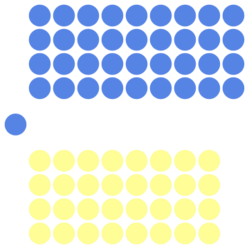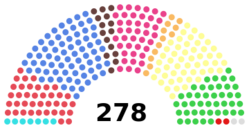Federal Diet (Erishlands)
This article is incomplete because it is pending further input from participants, or it is a work-in-progress by one author. Please comment on this article's talk page to share your input, comments and questions. Note: To contribute to this article, you may need to seek help from the author(s) of this page. |
Realm Diet Reicebsdagen | |
|---|---|
| Type | |
| Type | |
| Houses | Fulcsthing Londsthing |
| History | |
| Founded | 3 January 1813 |
| Leadership | |
Speaker of the Fulcsthing | Thourstain Yang, Democrat since 3 January 2021 |
Speaker of the Londsthing | Zobre Neulesdohter, Democrat since 3 January 2021 |
| Structure | |
| Seats | 277 (208 Representatives; 69 Senators) |
 | |
Staurthing political groups | Government (37)
Opposition (32)
|
 | |
Folkthing political groups | Government (78)
Opposition (70)
Independents (60)
|
| Elections | |
Staurthing voting system | Two-round proportional |
Folkthing voting system | Closed list dual mandate |
Last election | 20 December 2019 |
Next election | 19 December 2023 |
| Meeting place | |
| Reicebsdagen Building Fzorzborg Erishland | |
The Reicebsdag (Erish: Reicebsdagen [ˈʕ̞äi̯ːt͡ʃʰɐfs̪ˌz̪ɔːʕ̞ɐɬ], "Realm Diet") is the federal parliament of the Erishlands. It is the only federal institution that is directly elected. Because of the participation of the Confederal Council in the federal legislative process, it functions similarly to a lower house in other democracies, though the Reicebsdag itself is divided into two chambers: the Fulcsthing and the Londsthing. The Reicebsdag is established by Article IV, Chapter 1 of the Constitution of the Erish Confederation (Erish: Grouðloxo Xerscbondem), which lays out its composition and powers. The Reicebsdag meets in the Reicebsdag House (Erish: Reicebsdagebshousoð) in Fzorzborg. As of 3 January 2021, the presiding officers of the Reicebsdag are the President of the Fulcsthing, Senator Thourstain Yang, and the Speaker of the Londsthing, Representative Zobre Neulesdohter.
The Reicebsdag has several functions. As the federal legislature, it creates laws on areas of federal jurisdiction, but the Constitution also empowers it to legislate on certain areas of state jurisdiction. Such federally-created state laws, however, require the consent of the Bondemsraud, thus establishing the two bodies in a relationship similar to the houses of a bicameral parliament. The Reicebsdag itself is split into two chambers, the Fulcsthing and Londsthing, though the two share their standing committees, and sit jointly on certain matters like the annual budget. The most important differences between the two chambers is that the Fulcsthing has the exclusive power to hold the Cabinet to its confidence, and the Londsthing can initiate, amend and pass bills without the Fulcsthing's consent.
Erish citizens elect the entire Reicebsdag every four years. The overall number of seats in the Reicebsdag is set by the cubic root of the overall population as determined by the federal census, with the current Reicebsdag having 277 seats. 208 of these seats belong to the Representatives of the Reicebsthing, and are apportioned to the states based upon their population and elected by dual-mandate voting, where each constituency is represented by two Representatives. The remaining 69 seats belong to the Senators of the Staurthing, elected through a national two-round proportional vote. Midterm elections for the Reicebsdag can only be called over deadlocked legislation, and the elected Representatives and Senators only serve out the remainder of the four-year term.
The Reicebsdag was established in 1813 when the Constitution of the Erish Confederation came into effect. Under the original Constitution, the Reicebsdag consisted of two chambers, the Reicebsthing and the Staurthing, which acted as the lower and upper houses of the legislature respectively; the Bondemsraud was not generally considered a part of the regular legislative process. Over the course of time, however, changes in political contexts, the growth of the reach of the federal government, and gridlocks have led to the transformation of the Reicebsdag. Since 1914, the Staurthing's and Reicebthing's successors, the Fulcsthing and Londsthing, have shifted into roles that observers refer to as "semi-parliamentary".